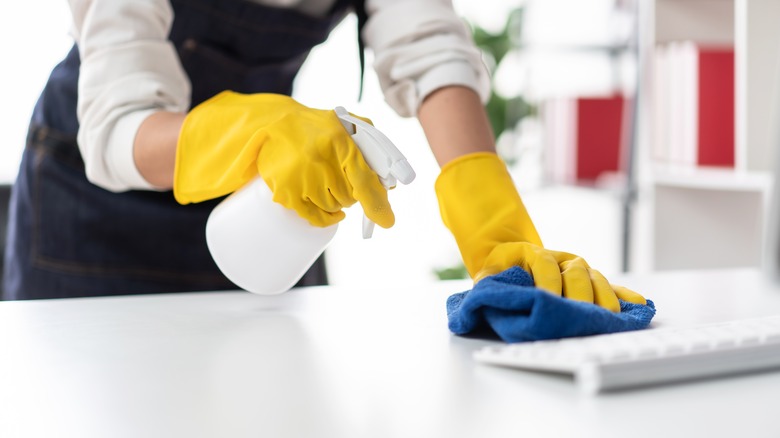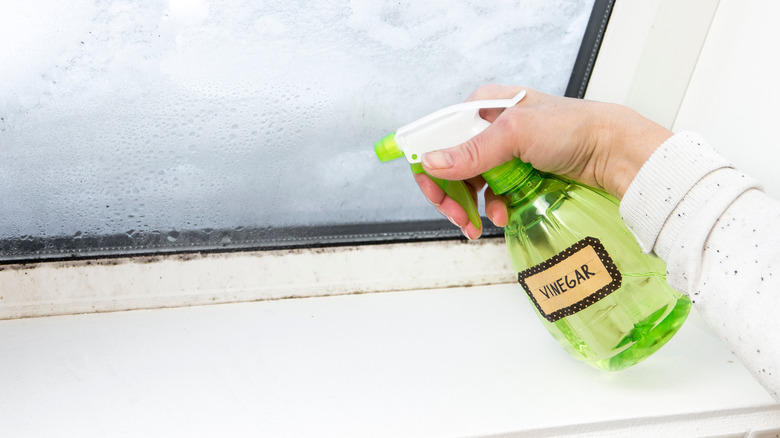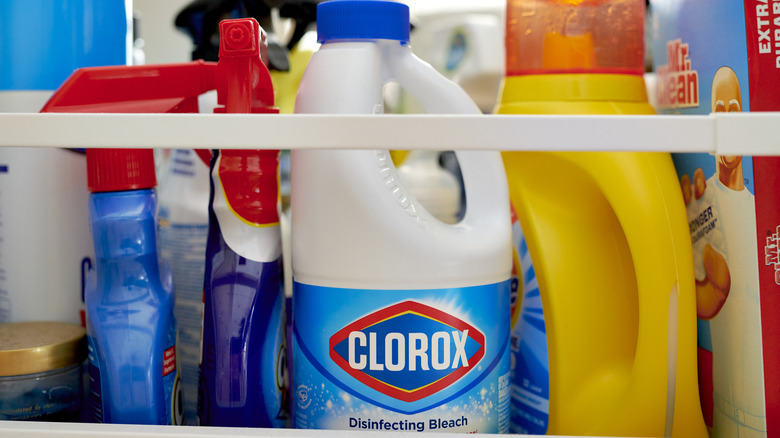Vinegar Vs Bleach: Which Is Really Best For Your Home Cleaning Necessities?
It seems like everywhere you look these days someone is hailing vinegar as a better cleaning solution over bleach. It certainly has the benefit of being a naturally-fermented liquid, whereas bleach gets its cleaning oomph from chemicals. Is vinegar always the right choice, though? Honestly, it depends on what you're cleaning and your goals. If you simply want to keep things dirt-free, vinegar may be the right choice, while disinfecting surfaces or objects quickly and thoroughly is a better job for bleach. This means that, just as white vinegar has a place in your cleaning cabinet, bleach does, too.
Since vinegar costs less than bleach, it's an economical choice that you may want to reach for as often as possible. For instance, 1 gallon of distilled white vinegar costs under $4 at Walmart, while a slightly-under 1 gallon jug of bleach costs over $6 at the same retailer. However, nothing works as swiftly and effectively as bleach to really disinfect surfaces. A 2022 study published by Viruses showed that vinegar does not kill the COVID-19 virus while bleach does, making it a better alternative when disinfecting rather than just cleansing. The trick is knowing when and what to clean with each of these products. Just be sure not to mix these cleaning solutions together, as that would form a potentially-deadly chlorine gas (per the Washington State Department of Health).
When to use vinegar for cleaning and some caveats
When using vinegar to keep your house clean, you can trust it to work as an effective glass cleaner. Add ¼ a cup of vinegar to a 16-ounce spray bottle topped off with water to clean windows and mirrors. Other types of glass, including coffee pots, are also safe to clean with vinegar. Descaling coffee makers is also another common use for this product. Additionally, it can be a good stain remover and mildew eliminator, so feel free to use it on grout.
Since it's made without chemicals, vinegar is certainly a more environmentally-friendly choice for cleaning over bleach, but keep in mind that its disinfectant properties are not as strong. To amp that up, add ½ a cup of borax to a gallon of vinegar to make a sprayable disinfectant solution. However, this won't be safe for all surfaces. Vinegar is an acid and that means it can damage things like stone countertops, screens on electronics, hardwood flooring, and even some small appliances like clothing irons. The stainless steel on some small appliances may also be made of a lesser-quality material than larger appliances and therefore more susceptible to damage from vinegar. Mild soap and water are a better alternative in these instances. Also avoid using it on rubber elements like gaskets and hoses, since the acid content can damage them — that means pouring it into your washing machine may not be a good idea.
When to consider using bleach instead
While vinegar has some disinfecting properties, using bleach is like calling in the big guns. When someone in your household has been sick, bleach is great for eliminating germs. Cleaning up after raw chicken touches surfaces in your kitchen may also call for bleach, since vinegar has to sit for 30 minutes or so to disinfect, and it's not as effective. Further, bleach is very good for decontaminating surfaces and objects after a natural disaster like a flood or when toilets overflow.
Safely using bleach as a disinfectant means cleaning up dirty areas with soap and water first. Then you can use a bleach solution made of ⅓ a cup of bleach mixed with 1 gallon of water at room temperature to further disinfect. To be effective, your bleach should contain 5% to 9% sodium hypochlorite, according to the Centers for Disease Control and Prevention. Keep in mind, too, that bleach and water mixtures lose their potency after 24 hours, so you may need to whip up a new batch daily.
However, there are some precautions to take before cleaning your home with bleach. First, read the instructions printed on the bottle and follow them carefully. Plan to wear gloves and only use bleach in a well-ventilated area that has open windows. Also wear a mask and goggles to protect your eyes and respiratory system. With some prudent discernment, you can safely employ bleach or vinegar to tackle all your home cleaning tasks.


